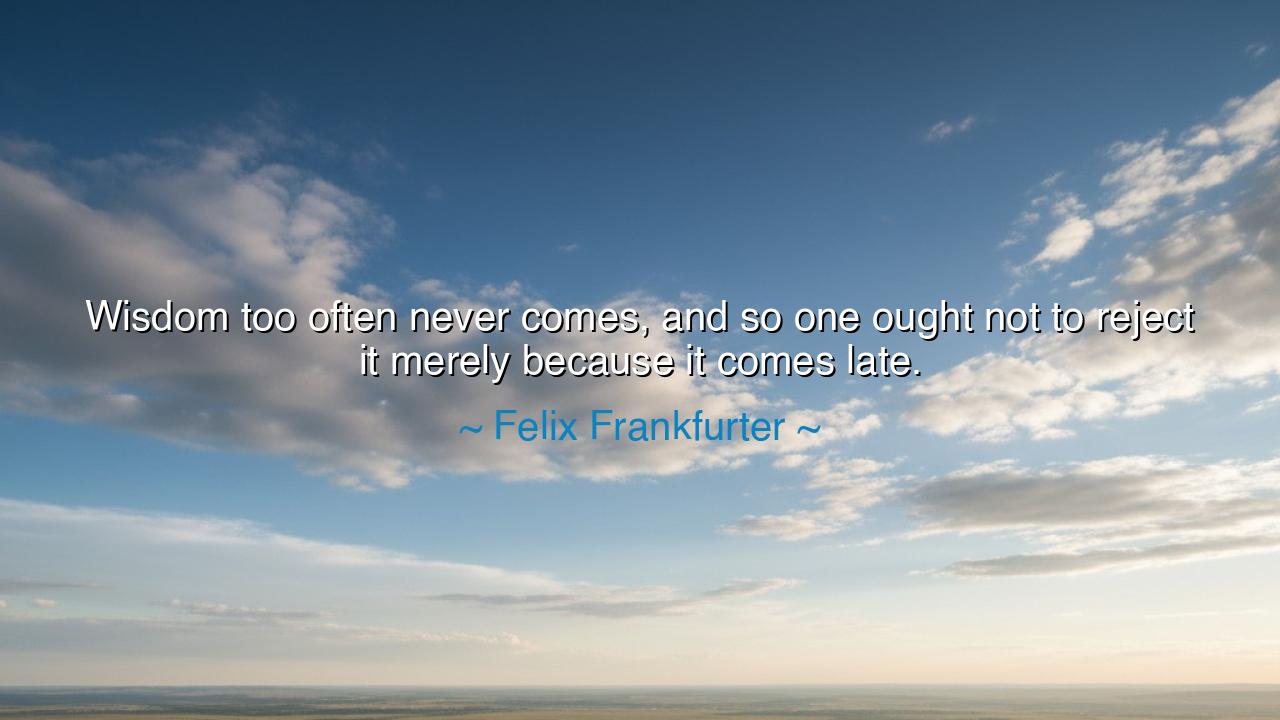
Wisdom too often never comes, and so one ought not to reject it
Wisdom too often never comes, and so one ought not to reject it merely because it comes late.






Hear now, O Children of Time, the words of the wise Felix Frankfurter, who spoke thus: “Wisdom too often never comes, and so one ought not to reject it merely because it comes late.” In this humble declaration, Frankfurter lays bare the heart of human experience. For how many times in life do we seek knowledge and understanding, only to find that they elude us in our youth, or fail to appear when we expect them most? And yet, do we cast them aside when they finally arrive, weathered by the winds of time? No, we must embrace them, even when they come with the grey of age upon them, for wisdom, though delayed, is still wisdom.
The young, in their fire and fervor, often believe that they possess all the answers. But the years—those silent, steady workers—reshape the heart, and through the trials of life, they weave truth and experience into the fabric of the soul. In the rush of youth, wisdom is but a distant echo, one that fades into the background of more pressing desires. And yet, as the years unfold, it comes not as a sudden burst of revelation, but as a slow, patient whisper—delicate, but filled with the weight of truth.
Consider, if you will, the story of Socrates, whose wisdom was born not from the quick flashes of youth, but from a lifetime spent in questioning, in searching, in contemplating. His insight did not arrive in his early days, but in the twilight of his years, when the world was heavy with doubt and confusion. He did not reject truth when it arrived later in his life, nor did he disdain the lessons learned through suffering and hardship. The wisdom he offered was earned, not given, and its value grew richer as the years passed. Socrates teaches us that wisdom, though it may be late, is never less powerful for it.
And so, O Seekers of the Eternal, let us not despair when wisdom seems to come too slowly or too late. Know that there is no time too late to receive the gifts that life has to offer. If it comes in the spring of youth, we cherish it; if it comes in the winter of age, we do the same. For what is wisdom but the understanding of the truth gained through both joy and sorrow, light and shadow? Each day is a step on the path to deeper understanding, and if that understanding comes late, it is no less precious.
Do not cast aside the wisdom that arrives, even if it takes many years to reach you. Let it find a home within your heart, for it is the final gift of life, the reward for perseverance, the summation of a life lived in search of meaning. Cherish it, for in its lateness lies the depth of all that has passed and all that is yet to come.






VTViem Tieu
Reading this makes me think about the relationship between age, experience, and understanding. Often, wisdom comes after repeated failures or late reflection, yet society tends to value early success and immediate insight. How can we reframe our perception so that delayed wisdom is celebrated rather than overlooked? I’d like a perspective on cultural or personal practices that help integrate late-learned lessons into ongoing life choices effectively.
CLChan Le
This quote prompts reflection on the human tendency to resist change or new perspectives once we feel set in our ways. It suggests that even delayed wisdom has transformative potential. How can individuals cultivate humility and adaptability to recognize valuable insights later in life? I also wonder about historical figures who gained crucial understanding late—what allowed them to embrace it and effect meaningful change despite timing challenges?
TH08. Le Trung Hau
I feel intrigued by this quote because it emphasizes the enduring value of wisdom, irrespective of when it arrives. It raises questions about how people evaluate advice or knowledge—do we sometimes dismiss ideas simply because they come too late to correct past mistakes? How can one develop the mindset to embrace lessons at any point, turning hindsight into actionable insight rather than regret?
NSVu Ngoc Son
This statement feels both comforting and challenging. It implies that wisdom does not adhere to our schedule, and impatience can blind us to valuable insight. I wonder how this idea applies in mentorship or education, where guidance may be ignored until a person reaches the right stage of understanding. Could organizations and societies benefit from cultivating structures that allow people to access wisdom at any stage of life?
LMHa Le Minh
Reading this evokes a sense of humility. It reminds me that acquiring wisdom is a lifelong process and that even late realizations can profoundly influence decisions and behavior. I’m curious how one can cultivate openness to late-arriving wisdom without letting pride or previous mistakes create resistance. Can reflection or mindfulness practices help in recognizing and integrating lessons that emerge later than desired?